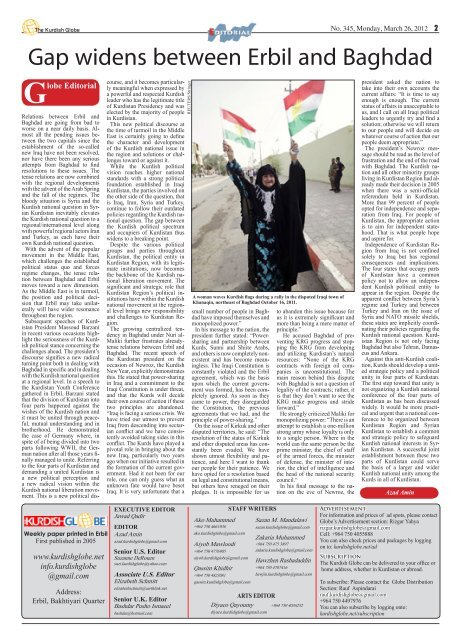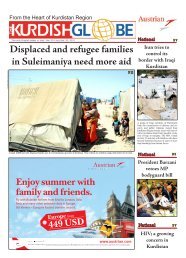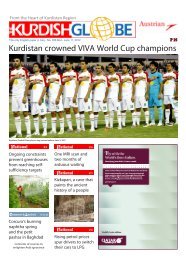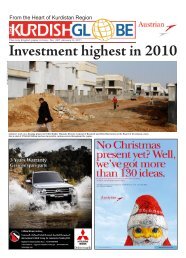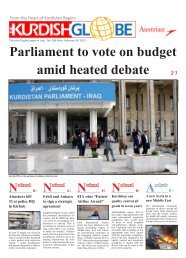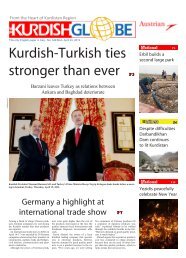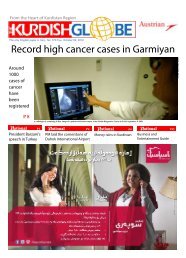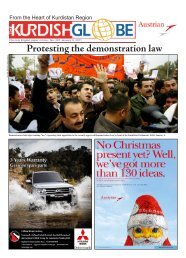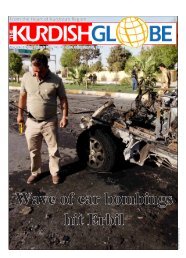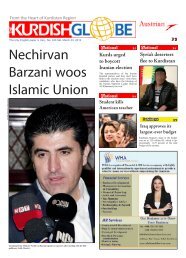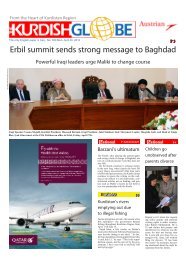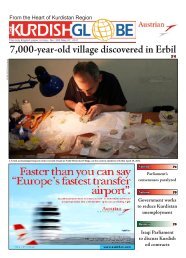National - Kurdish Globe
National - Kurdish Globe
National - Kurdish Globe
- No tags were found...
You also want an ePaper? Increase the reach of your titles
YUMPU automatically turns print PDFs into web optimized ePapers that Google loves.
The <strong>Kurdish</strong> <strong>Globe</strong> No. 345, Monday, March 26, 2012 2Gap widens between Erbil and Baghdad<strong>Globe</strong> EditorialRelations between Erbil andBaghdad are going from bad toworse on a near daily basis. Almtmost all the pending issues bettween the two capitals since theestablishment of the so-callednew Iraq have not been resolved,nor have there been any seriousattempts from Baghdad to findresolutions to these issues. Thetense relations are now combinedwith the regional developmentswith the advent of the Arab Springand the fall of the regimes. Thebloody situation is Syria and the<strong>Kurdish</strong> national question in Syritian Kurdistan inevitably elevatesthe <strong>Kurdish</strong> national question to aregional/international level alongwith powerful regional actors Iranand Turkey, as each have theirown <strong>Kurdish</strong> national question.With the advent of the popularmovement in the Middle East,which challenges the establishedpolitical status quo and forcesregime changes, the tense relattion between Baghdad and Erbilmoves toward a new dimension.As the Middle East is in turmoil,the position and political decistsion that Erbil may take unilateterally will have wider resonancethroughout the region.Subsequent speeches of Kurditistan President Massoud Barzaniin recent various occasions highltlight the seriousness of the Kurditish political stance concerning thechallenges ahead. The president’sdiscourse signifies a new radicalturning point both in dealing withBaghdad in specific and in dealingwith the <strong>Kurdish</strong> national questionat a regional level. In a speech tothe Kurdistan Youth Conferencegathered in Erbil, Barzani statedthat the division of Kurdistan intofour parts happened against thewishes of the <strong>Kurdish</strong> nation andit must be united through peaceftful, mutual understanding and inbrotherhood. He demonstratedthe case of Germany where, inspite of of being divided into twoparts following WWII, the Germtman nation after all those years fintnally managed to unite. Referringto the four parts of Kurdistan anddemanding a united Kurdistan isa new political perception anda new radical vision within the<strong>Kurdish</strong> national liberation movemtment. This is a new political disctcourse, and it becomes particularltly meaningful when expressed bya powerful and respected <strong>Kurdish</strong>leader who has the legitimate titleof Kurdistan Presidency and waselected by the majority of peoplein Kurdistan.This new political discourse atthe time of turmoil in the MiddleEast is certainly going to definethe character and developmentof the <strong>Kurdish</strong> national issue inthe region and solutions or challtlenges toward or against it.While the <strong>Kurdish</strong> politicalvision reaches higher nationalstandards with a strong politicalfoundation established in IraqiKurdistan, the parties involved onthe other side of the question, thatis Iraq, Iran, Syria and Turkey,continue to follow their outdatedpolicies regarding the <strong>Kurdish</strong> nattional question. The gap betweenthe <strong>Kurdish</strong> political spectrumand occupiers of Kurdistan thuswidens to a breaking point.Despite the various politicalgroups and parties throughoutKurdistan, the political entity inKurdistan Region, with its legitimtmate institutions, now becomesthe backbone of the <strong>Kurdish</strong> nattional liberation movement. Thesignificant and strategic role thatKurdistan Region’s political inststitutions have within the <strong>Kurdish</strong>national movement at the regionatal level brings new responsibilityand challenges to Kurdistan Regtgion.The growing centralized tendtdency in Baghdad under Nuri al-Maliki further frustrates alreadytenserelations between Erbil andBaghdad. The recent speech ofthe Kurdistan president on theoccasion of Newroz, the <strong>Kurdish</strong>New Year, explicitly demonstratesthis. He stated that power-sharingin Iraq and a commitment to theIraqi Constitution is under threat,and that the Kurds will decidetheir own course of action if thesetwo principles are abandoned.“Iraq is facing a serious crisis. Wehave tried our utmost to preventIraq from descending into sectaritian conflict and we have consisttently avoided taking sides in thisconflict. The Kurds have played apivotal role in bringing about thenew Iraq, particularly two yearsago when our initiative resulted inthe formation of the current goveternment. Had it not been for ourrole, one can only guess what anunknown fate would have besetIraq. It is very unfortunate that aREUTERS/StringerA woman waves <strong>Kurdish</strong> flags during a rally in the disputed Iraqi town ofKhanaqin, northeast of Baghdad October 16, 2011.small number of people in Baghdtdad have imposed themselves andmonopolized power.”In his message to the nation, thepresident further stated: “Powersharingand partnership betweenKurds, Sunni and Shiite Arabs,and others is now completely nonexistentand has become meanitingless. The Iraqi Constitution isconstantly violated and the Erbilagreement, which was the basisupon which the current governmtment was formed, has been comptpletely ignored. As soon as theycame to power, they disregardedthe Constitution, the previousagreements that we had, and theprinciple of power-sharing.”On the issue of Kirkuk and otherdisputed territories, he said: “Theresolution of the status of Kirkukand other disputed areas has conststantly been evaded. We haveshown utmost flexibility and pattience, and here I want to thankour people for their patience. Wehave opted for a resolution basedon legal and constitutional means,but others have reneged on theirpledges. It is impossible for usto abandon this issue because forus it is extremely significant andmore than being a mere matter ofprinciple.”He accused Baghdad of prevtventing KRG progress and stopptping the KRG from developingand utilizing Kurdistan’s naturalresources: “None of the KRGcontracts with foreign oil comptpanies is unconstitutional. Themain reason behind this disputewith Baghdad is not a question oflegality of the contracts; rather, itis that they don’t want to see theKRG make progress and strideforward.”He strongly criticized Maliki formonopolizing power: “There is anattempt to establish a one-millionstrong army whose loyalty is onlyto a single person. Where in theworld can the same person be theprime minister, the chief of staffof the armed forces, the ministerof defense, the minister of intertrior, the chief of intelligence andthe head of the national securitycouncil.“In his final message to the nattion on the eve of Newroz, thepresident asked the nation totake into their own accounts thecurrent affairs: “It is time to sayenough is enough. The currentstatus of affairs in unacceptable tous, and I call on all Iraqi politicalleaders to urgently try and find asolution; otherwise we will returnto our people and will decide onwhatever course of action that ourpeople deem appropriate.”The president’s Newroz messtsage should be read as the level offrustration and the end of the roadwith Baghdad. The <strong>Kurdish</strong> nattion and all other minority groupsliving in Kurdistan Region had alrtready made their decision in 2005when there was a semi-officialreferendum held in Kurdistan.More than 99 percent of peopleopted for independence and separtration from Iraq. For people ofKurdistan, the appropriate actionis to aim for independent statehthood. That is what people hopeand aspire for.Independence of Kurdistan Regtgion from Iraq is not confinedsolely to Iraq but has regionalconsequences and implications.The four states that occupy partsof Kurdistan have a commonpolicy not to allow an independtdent <strong>Kurdish</strong> political entity toappear in the region. Despite theapparent conflict between Syria’sregime and Turkey and betweenTurkey and Iran on the issue ofSyria and NATO missile shields,these states are implicitly coordintnating their policies regarding the<strong>Kurdish</strong> national question. Kurditistan Region is not only facingBaghdad but also Tehran, Damasctcus and Ankara.Against this anti-<strong>Kurdish</strong> coalittion, Kurds should develop a uniteted strategic policy and a politicalunity in four parts of Kurdistan.The first step toward that unity isnot organizing a <strong>Kurdish</strong> nationalconference of the four parts ofKurdistan as has been discussedwidely. It would be more practictcal and urgent that a national conftference to be organized betweenKurdistan Region and SyrianKurdistan to establish a commonand strategic policy to safeguard<strong>Kurdish</strong> national interests in Syritian Kurdistan. A successful jointestablishment between these twoparts of Kurdistan could servethe basis of a larger and wider<strong>Kurdish</strong> national unity among theKurds in all of Kurdistan.Azad AminWeekly paper printed in ErbilFirst published in 2005www.kurdishglobe.netinfo.kurdishglobe@gmail.comAddress:Erbil, Bakhtiyari QuarterEXECUTIVE EDITORJawad QadirEDITORAzad Aminazad.kurdishglobe@gmail.comSenior U.S. EditorSuzanne DeRouensuzi.kurdishglobe@yahoo.comAssociate U.S. EditorElizabeth Schmittelizabethschmitt@earthlink.netSenior U.K. EditorBashdar Pusho Ismaeelbashdar@hotmail.comAko Muhammed+964 750 4661936ako.kurdishglobe@gmail.comAiyob Mawloodi+964 750 4776905aiyob.kurdishglobe@gmail.comQassim Khidhir+964 750 4823081qassim.kurdishglobe@gmail.comSTAFF WRITERSSazan M. Mandalawisazan.kurdishglobe@gmail.comZakaria Muhammed+964 750 475 3897zakaria.kurdishglobe@gmail.comHawzhen Rashadaddin+964 750 4707416hawjin.kurdishglobe@gmail.comARTS EDITORDiyaco Qayoumy +964 750 4036252diyaco.kurdishglobe@gmail.comAdvertisementFor information and prices of ad spots, please contact<strong>Globe</strong>’s Advertisement section: Rizgar Yahyarizgar.kurdishglobe@gmail.comCell: +964 750 4055888You can also check prices and packages by loggingon to: kurdishglobe.net/adSubscriptionThe <strong>Kurdish</strong> <strong>Globe</strong> can be delivered to your office orhome address, whether in Kurdistan or abroad.To subscribe: Please contact the <strong>Globe</strong> DistributionSection: Rauf Aspindarairauf.kurdishglobe@gmail.com+964 750 4497976You can also subscribe by logging onto:kurdishglobe.net/subscription


